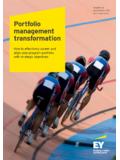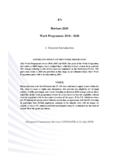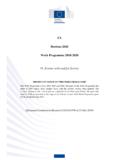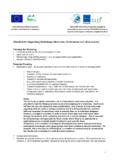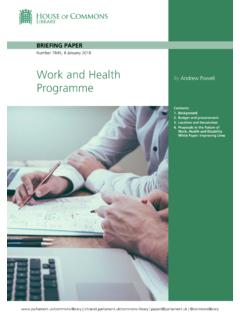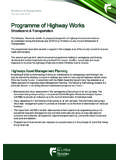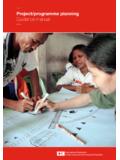Transcription of Focus on the Trinidad & Tobago Budget 2018 - EY
1 Trinidad & Tobago Budget 2018 . Caveat The Trinidad & Tobago Budget 2018 is based on the Economic Policy Statement, entitled Changing the Paradigm: Putting the Economy on a Sustainable Path, . delivered by the Minister of Finance, the Honourable Mr. Colm Imbert, in Parliament on 2 October 2017. This review summary was prepared by EY and is intended for the benefit of our clients and associates as a general guide. Readers are encouraged to consult with professional advisors for advice concerning specific legal, accounting or tax matters before making any decision. This publication is distributed with the understanding that Ernst & Young Services Limited or any other member of the global Ernst & Young organization is not responsible for the result of any actions taken on the basis of this publication, nor for any errors or omissions contained herein. Ernst & Young Services Limited 5/7 Sweet Briar Road St.
2 Clair, Port of Spain Trinidad , Tel: +1 868 628 1105. Fax: +1 868 622 0918. Email: Website: 2 October 2017. EY Focus on Trinidad & Tobago Budget 2018 . Table of contents Chairman's Executive 2018 fiscal Income Energy sector Analysis of tax revenues ..26. Analysis of recurrent government Status of fiscal measures Property tax appendix ..32. Chairman's Message In his third Budget presentation, the Minister of Finance, the Honourable Mr. Colm Imbert, was explicit in detailing the very significant economic challenges faced by Trinidad & Tobago , which are characterized by the following elements: A dramatic decline in oil and gas taxes denominated in US$ and in the price for petroleum products. A persistent excessive demand (vs supply) for forex, which can be remedied by allowing the free floatation of the exchange rate, which will drive inflation and wage demands but potentially curtail sales.
3 The very high level of government expenditure that individuals and businesses have become addicted to and which cannot be sustained without continuing to adversely impact the country's debt profile. In EY's view, certain fundamental principles must be established and adopted as integral to the internal restructuring of the country. These include: A commitment to economic stability, a freely floating exchange rate and eliminating the fiscal deficit which has become part and parcel of the country's economic framework for several years. A steady but irreversible commitment to reduce the role of government in areas of national and strategic importance with a Focus on outsourcing or divesting of many services, thereby improving the quality of services in many essential areas and by taking steps to significantly improve the ease of doing business in Trinidad & Tobago . A clear commitment by the private sector to invest in territories outside of Trinidad & Tobago and to develop export led activities and an increasing alignment of tax incentives toward these activities.
4 Most importantly, embarking on a process to involve labour, the public and private sectors and all other stakeholders in planning a realistic path for the country over the next five years. With the right attitude and Focus , the country will be able to manage the current financial storm, once there is an unwavering commitment to certain core principles. Without these principles there is a significant risk that the future would be adversely affected. Time is of the essence and all stakeholders need to approach these challenges with maturity and realism. We thank you all and welcome your feedback. Colin Soo Ping Chow Executive Chairman EY Caribbean Ltd. EY Focus on Trinidad & Tobago Budget 2018 | 1. Executive Overview Changing the course of our financial destiny Trinidad & Tobago may lie just south of the hurricane belt, but the country is no doubt in the middle of an economic and financial storm.
5 In this, the third year of low oil and gas prices, substantial price rebound appears remote and significant changes have to be made to reverse the major declines in our revenues and foreign exchange. To appreciate the severity of our situation, consider that revenues from the upstream petroleum sector fell from TT$ billion in 2014 to TT$ billion in 2017 and foreign exchange from the energy sector has declined from US$ billion in 2011 to US$500 million in 2017. In fiscal 2018 , Government is predicating its Budget on an oil price of US$52 per barrel and a gas price of US$ per MMBtu. As a result, of continuing weak energy prices, the Government is faced with curbing the consumption preferences of a population that has grown accustomed to significantly larger tax inflows. Norway just reported that its investment fund, driven from its Oil & Gas Revenues, has surpassed one trillion US dollars.
6 With just over five million people and production levels slightly in excess of million barrels per day, their fund equates to US$177 million per person. In comparison, our HSF is just about US$ billion. Despite Norway's high taxation on petroleum net profits (78%), the country maintained disciplined expenditure in times of high oil prices and developed technology and systems to increase efficiencies. Given our level of production on a per barrel basis, our HSF could have been multiple times greater, had we adopted a similar economic discipline with a similar tax regime. Recession limits a nation's economic options because it creates a situation where spending must be curbed without stifling economic growth, while also maintaining economic stability and stimulating business activity. The concept of Value for Money becomes integral as we are all forced to do more with less. As a result, the annual Budget process has become one filled with apprehension.
7 We understand that the government needs to increase revenues while reducing expenditure, which adversely impacts our economic condition. So how do you implement measures to combat the tough economic climate, while maintaining social equity in an increasingly crime ridden environment? The Honourable Minister of Finance has attempted to prepare a Budget that seeks to provide fiscal incentives, such as promoting housing development and farming. He has also sought to implement revenue generating measures, such as increasing the burden of taxes on standard rated corporations, commercial banks, and energy companies. His chosen path attempts to equally distribute the fiscal burden amongst all members of society and the business community. 2 | EY Focus on Trinidad & Tobago Budget 2018 . Divestment The Government, however, also needs to complete and improve its divestment programme, transferring the operations of potentially viable businesses out of the hands of the state and into the hands of the private sector.
8 This will allow the government to Focus on infrastructure development, increasing diversification and reinvesting in growth industries, rather than operating expenses. The wage bill, which now accounts for 31% of annual revenue, continues to increase with little or no improvement in service quality. And the Minister only mentioned divestment of the CLICO and CLF assets, but there was no distinctive divestment programme or privatization plan for the many state enterprises. We, therefore, are left with no clear strategy on how the Government's wage bill is going to be significantly reduced. Diversification It is widely believed that the private sector has been complacent, with companies preferring retail and distribution rather than manufacturing, thereby increasing the foreign exchange deficit. In order to manufacture with an eye on exporting and earning much needed foreign exchange, however, we need volume.
9 To achieve volume, we need to be price competitive and diversify. But to be price competitive and diversify, we first have to overcome the hurdle of the productivity or lack thereof of the labour force. With absenteeism approaching 40%, manufacturers have to hire more staff to ensure the efficient running of its operations, making the products uncompetitive in global markets. Should we continue to allow our manufacturing sector to be blighted by the labour issues? Should we adopt an import the labour export the product mentality, if our people do not want to work? The agri-business sector is on a growth path globally, but our agricultural sector has been plagued by this shortage of labour. As the food bill continues to rise, the question becomes whether or not we need greater incentives or more drastic measures to shift the paradigm. The Minister has put the incentives in place to encourage export and we are pleased to hear acknowledgement of the inefficiencies and the difficulty in doing business, but the labour issue is not one that can be cured by Government alone.
10 It requires a robust effort from the private sector, the trade unions and the industrial court to catalyze an accountable work force, as we no longer have the luxury of accepting mediocrity. The Government will attempt to enhance the entrepreneurial eco-system by implementing much needed incentives, but it is up to T&T to pursue these initiatives. SME development provides opportunities for self-employment and fosters a culture of accountability as young people learn to understand the value of hard work. As such, we applaud the allocation of TT$50 million to assist in EY Focus on Trinidad & Tobago Budget 2018 | 3. financing their seed capital and growth. The success of this spend will, however, be dependent on further support for these young entrepreneurs in accounting, supply logistics and operational efficiencies. The Government's housing and construction grant is also laudable as it broadens the opportunity for PPP relationships where any small developer can participate in generating low cost housing.









